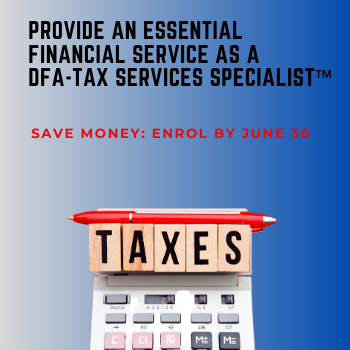Last updated: June 24 2020
The Soft Skills Matter in Tax Services

Tax Services Specialists must have more than precise technical and research skills; for them, the soft skills matter in building long term relationships with their clients and various regulators. Now more than ever, Canadians need caring support and someone to help them navigate the complex tax and financial repercussions of the pandemic and associated benefit programs. Read on for the soft skills and processes that will allow tax specialists to fulfill an essential service.
What Soft Skills do Tax Services Specialists Need?
Tax specialists must have excellent communications skills. In providing high value advice at crucial financial times, they act as an articulate tax educator, both verbally and in writing, to take their individual client, and where required, the family, on a journey to continued financial health.
Tax specialists excel at conducting thorough interviews, not just during tax season, but by making a point of meeting the client more often: before, during and after significant lifecycle events. The result is a relationship built on trust, and a trusted advisor has the privilege of obtaining all the information required to make the most informed recommendations, even at the most difficult times in life: when there is great loss because of the onset of relationship breakdown, illness or death.
Tax specialists are also advocates for their clients. They position themselves to be the “go to” financial advisor throughout a lifecycle of personal and financial events. They coach their clients to always ask themselves the following question, “Is there a tax consequence to the decision I must make?” If the answer is “maybe”, the right action is to seek advice. In doing so, clients and advisors can improve long term, after-tax results as joint-decision-makers in a multi-stakeholder team. The bigger the financial decision, the more important this “pre-consultation” is.
Perhaps most important, they represent their clients with confidence and professionalism to the tax department, whether at time of audit or in adjusting prior-filed returns. This is possible because they know how to research relevant tax law, understanding how it is administered by CRA and what the outcomes of recent jurisprudence has been.
In advocating for their clients’ Taxpayer Rights, Tax Services Specialists are also highly skilled at applying relevant tax provisions to all the prior filed returns CRA may select for audit; thereby  matching the “hindsight” CRA brings to the audit process, with skillful precision in applying tax provisions across multiple years. Because they are passionate about making sure their client pays only the correct amount of tax and no more, Tax Services Specialists are stewards of tax efficient solutions.
matching the “hindsight” CRA brings to the audit process, with skillful precision in applying tax provisions across multiple years. Because they are passionate about making sure their client pays only the correct amount of tax and no more, Tax Services Specialists are stewards of tax efficient solutions.
Educator, advocate and steward: that’s the three-part role of the Tax Services Specialist. This professional provides outstanding value in the evolving new tax and financial services industry.
Strategy and Process for Advice-Giving
Tax specialists expand on the role of a traditional tax preparer, offering holistic tax planning advice to reduce a family’s overall tax liability over the long run and reduce poverty cycles by helping families save for the future using all their tax benefits.
The Process Used by Tax Services Specialists. Tax Services Specialists may be independent business owners or employees in accounting, legal or financial services firms. They may also work in government. Knowledge Bureau graduates learn the Six Steps of a Tax Advisory Process, in the DFA-Tax Services Specialist™ Program :
- Periodic Client Consultations. Conducting a thorough interview at least annually to determine changes in life events, financial events and economic events that affect the tax return, as well as understanding client objectives for savings and debt management
- Tax Compliance. Assembly of information on tax returns and the multiple available variations to get the best after-tax results, not just in the current tax year, but in carry-back and carry forward periods, or at audit time.
- Financial Analysis. Analyzing books and records for additional tax savings or potential tax risks, and evaluation of after-tax results against family wealth management goals.
- Tax Planning. Positioning the client for the most favorable financial opportunities in the future: tax-efficient debt management, tax-efficient employment negotiations, tax-efficient investing and retirement planning and, finally, setting the stage for an orderly transition of assets: tax efficient estate and succession plans with optimal tax implications.
- Stewardship of Sustainable Income and Wealth. Quite possibly the most important role of all is the advocacy and stewardship a confident tax specialist brings to the negotiating of required tax payments and payment terms with the CRA. This is, after all, about what financial resources your clients get to keep.
- Ongoing Tax Research. Conducting research on applicable provisions and laws that may impact the taxpayers they are working with. With extensive research skills, these specialists can expertly prepare an audit defense, both pre- and post-assessment.
By following a consistent process to tax compliance and planning, Tax Services Specialists actively manage opportunities for clients to accumulate, build, preserve and transition sustainable family wealth.
Ready to help? Check out the online curriculum options available from Knowledge Bureau to get your credentials as a DFA-Tax Services Specialist™ this summer.
Bonus: From now until June 30, come to the September 30 Virtual CE Summit for free when you enrol in a designation program. This is a $695 value.
COPYRIGHT OWNED BY KNOWLEDGE BUREAU INC., 2020.
UNAUTHORIZED REPRODUCTION, IN WHOLE OR IN PART, IS PROHIBITED.
